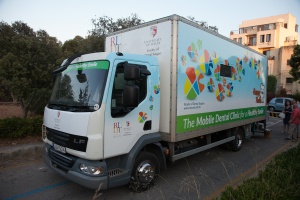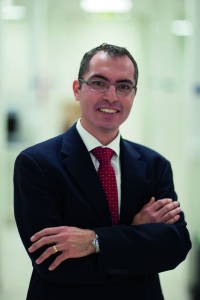The RIDT-funded Mobile Dental Unit is now on the road. But what does it do? And why is it important to the nation’s health? We spoke to Prof Nikolai Attard and Dr Gabriella Gatt to get the whole story.
Two years ago, Prof Nikolai Attard, the Dean of the Faculty of Dental Surgery, came up with the idea to have a mobile dental unit roaming the streets of Malta. The vehicle wouldn’t only do educational activities, but also compile a database of the country’s oral health.
Countless meetings and hundreds of hours of mental and manual labour later – along with some very generous donations – have now turned this dream into reality. But getting here has been no mean feat… and it’s only the beginning!
“The project has had many different phases,” explains Prof Attard, “and it has only been possible thanks to a number of people and sponsors who have aided us throughout the journey with whatever we have needed.”
One of these people has been Dr Gabriella Gatt, the project coordinator of the Mobile Dental Unit and an assistant lecturer at the University of Malta. She has been involved in the project from the very beginning, and her hands-on role has seen this come to fruition.
“We started off with researching mobile dental units and figuring out what we needed,” says Dr Gabriella. “It may seem obvious, but finding a big enough truck and the equipment, and everything else that goes into creating a fully-functional, mobile dental unit, was one of the hardest parts.”
Thankfully, many sponsors, sourced through RIDT, were willing to help out with this project. These are GSK Ltd, Cherubino Ltd, Good Causes Fund, Express Group, Rahuma International, Bart Enterprises Ltd, ProHealth Ltd and Suratek Ltd.
“Nothing’s been taken out internally in terms of resources,” adds Prof Attard. “This has been a self-sustained project supported entirely by the community which, so far, it is doing what it was designed to do: be an asset to the Dental Faculty.”
The mobile unit is now on the streets, and it’s ready to start its work by not only giving on-the-spot check ups to various people and communities, but also to compile an anonymous database of the status of the nation’s oral health. The latter will give current and future health care providers an invaluable source of information about the Maltese and Gozitan population.
“Whoever gets access to the Mobile Unit is going to be screened, and will receive a check up,” explains Dr Gatt. “The person will also be told if they need to visit a dentist or change their eating and/or drinking habits and their oral hygiene practices. Ultimately, each person will be receiving tailored advice.”
“Moreover, in extreme emergencies, the Dental Unit will also do procedures on patients,” adds Prof Attard. “But the point of the Unit isn’t to do this per se, but rather to bring oral health – which can affect our overall health – to the forefront.”
The Mobile Dental Unit is going to be an invaluable asset to all those currently working in the field of dentistry. For example, Dr Gatt, who is currently working on a PhD researching tooth erosion in the younger generations, will be able to use data collected through this clinic on wheels to study the current local situation.
More importantly, however, the Mobile Unit will also be able to go to communities that may not always be able to go to the dentist themselves, including the elderly and the disabled.
“While organising a recent event, the Special Olympics – Special Smiles screening event, which took place in Naxxar, we were faced with the situation where not everyone invited could attend due to transport issues. With this truck-cum-clinic, we will now be able to go to them directly, and make oral health more accessible than ever before,” says Dr Gatt.
It’s also important to remember that bad oral health can affect the overall health of the body – the mouth, after all, is part of our body. “Infections, gum disease and other types of mouth-related illnesses can have an influence on the body, and, by identifying them earlier on, people will be able to enjoy better health overall,” explains Prof Attard.
Now that it’s on the road, the Mobile Dental Unit will be visiting schools, homes for the elderly, factories, parishes and other communities in the upcoming months and years, bringing good oral health to the country.
‘This will be a great exercise for everyone involved,” says Dr Gatt. “Patients get a free oral health check, while those on board will be able to teach the next generation of dental specialists through real-life work.”
In fact, the crew on the Mobile Dental Unit will, at times, include dental students, all from the different courses that the Faculty itself is offering. This will include hygienists (people who specialise in providing education about oral health), dental technologists (people who de velop prostheses and other appliances), and dental assistants (people who help the other professionals conduct their clinical activities).
velop prostheses and other appliances), and dental assistants (people who help the other professionals conduct their clinical activities).
“Putting it all together has been quite the ride… excuse the pun! But, thankfully, we have found the support we needed, and now look forward to commencing the second and more important part of the project,” Prof Attard concludes.
The completion of phase one means that the Mobile Dental Unit is now on the roads, and it is a drive to your Healthy Smile… So keep your eyes peeled for this truck as it sets out to do its job!
Help us fund more projects like this as well as research in all the faculties by donating to RIDT. Click here for more information on how to donate.



